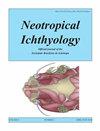对葡萄眼海鲈(Hemilutjanus macrophthalmos)祖先的调查揭示了Acropomatiformes (Teleostei: Percomorpha)的新界限和关系。
IF 2
4区 生物学
Q1 ZOOLOGY
引用次数: 2
摘要
175年来,人们在东太平洋沿海水域发现了一种不起眼的鲈鱼——葡萄眼海鲈(Hemilutjanus macrophthalmos)。迄今为止,其系统发育定位和分类一直被忽视。对半足的初步骨学检查暗示它可能与肢形目有亲缘关系。为了验证这一假设,我们利用UCE和Sanger序列数据进行了系统发育分析,研究了Hemilutjanus的位置以及Acropomatiformes的限制和关系。我们表明,Hemilutjanus是一种malakichthyid,我们的结果证实了早期的研究已经解决了一个多系的Polyprionidae;据此,我们将其命名为新科立体蚤科(Stereolepididae)。经过这些修订,Acropomatiformes现在由:Acropomatidae;Banjosidae;Bathyclupeidae;Champsodontidae;Creediidae;Dinolestidae;Epigonidae;Glaucosomatidae;Hemerocoetidae;Howellidae;Lateolabracidae;Malakichthyidae;Ostracoberycidae;Pempheridae;Pentacerotidae;Polyprionidae;Scombropidae;新科立体附睾科;Symphysanodontidae;Synagropidae;和Schuettea。最后,利用我们的新假设,我们证明了acropomatiforms反复进化出生物发光,并在浅水和深海之间过渡。本文章由计算机程序翻译,如有差异,请以英文原文为准。
Investigations into the ancestry of the Grape-eye Seabass (Hemilutjanus macrophthalmos) reveal novel limits and relationships for the Acropomatiformes (Teleostei: Percomorpha)
Abstract For 175 years, an unremarkable bass, the Grape-eye Seabass (Hemilutjanus macrophthalmos), has been known from coastal waters in the Eastern Pacific. To date, its phylogenetic placement and classification have been ignored. A preliminary osteological examination of Hemilutjanus hinted that it may have affinities with the Acropomatiformes. To test this hypothesis, we conducted a phylogenetic analysis using UCE and Sanger sequence data to study the placement of Hemilutjanus and the limits and relationships of the Acropomatiformes. We show that Hemilutjanus is a malakichthyid, and our results corroborate earlier studies that have resolved a polyphyletic Polyprionidae; accordingly, we describe Stereolepididae, new family, for Stereolepis. With these revisions, the Acropomatiformes is now composed of the: Acropomatidae; Banjosidae; Bathyclupeidae; Champsodontidae; Creediidae; Dinolestidae; Epigonidae; Glaucosomatidae; Hemerocoetidae; Howellidae; Lateolabracidae; Malakichthyidae; Ostracoberycidae; Pempheridae; Pentacerotidae; Polyprionidae; Scombropidae; Stereolepididae, new family; Symphysanodontidae; Synagropidae; and Schuettea. Finally, using our new hypothesis, we demonstrate that acropomatiforms repeatedly evolved bioluminescence and transitioned between shallow waters and the deep sea.
求助全文
通过发布文献求助,成功后即可免费获取论文全文。
去求助
来源期刊

Neotropical Ichthyology
生物-动物学
CiteScore
2.80
自引率
17.60%
发文量
24
审稿时长
6-12 weeks
期刊介绍:
Neotropical Ichthyology is the official journal of the Sociedade Brasileira de Ictiologia (SBI). It is an international peer-reviewed Open Access periodical that publishes original articles and reviews exclusively on Neotropical freshwater and marine fishes and constitutes an International Forum to disclose and discuss results of original research on the diversity of marine, estuarine and freshwater Neotropical fishes.
-Frequency: Four issues per year published only online since 2020, using the ‘rolling pass’ system, which posts articles online immediately as soon as they are ready for publication. A searchable and citable Digital Object Identifier (DOI) is assigned to each article immediately after online publication, with no need to await the issue’s closing.
-Areas of interest: Biology, Biochemistry and Physiology, Ecology, Ethology, Genetics and Molecular Biology, Systematics.
-Peer review process: The Editor-in-Chief screens each manuscript submitted to Neotropical Ichthyology to verify whether it is within the journal’s scope and policy, presents original research and follows the journal’s guidelines. After passing through the initial screening, articles are assigned to a Section Editor, who then assigns an Associate Editor to start the single blind review process.
 求助内容:
求助内容: 应助结果提醒方式:
应助结果提醒方式:


